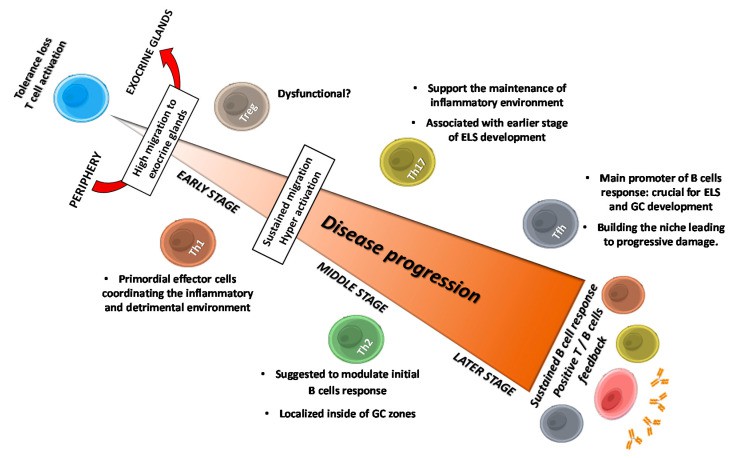Immune checkpoint therapy is a method that uses monoclonal antibody drugs to block specific immune checkpoints to activate or inhibit immune responses. It has significant effects on the treatment of certain cancers. The application of immune checkpoint therapy in Sjogren's Syndrome (SS) is in the early stages of investigation.
Sjogren's Syndrome (SS) is an autoimmune disease characterized by chronic inflammation and immune system dysfunction. In SS, the immune system mistakenly targets the salivary and lacrimal glands, leading to dryness of the eyes and mouth. In certain cases, the SS may have been a worsening of a previous autoimmune rheumatic condition. The immune dysregulation involves T cells, B cells, and inflammatory cytokine, exhibiting acinar and ductal damage and a predominant T-cell infiltrate in histopathology. When the CTLA-4 and PD-1 ICPs were blocked in cancer patients, some of them had unfavorable autoimmune disorders, including SS.
 Fig 1 Sequential roles of T cells in SS progression.1,2
Fig 1 Sequential roles of T cells in SS progression.1,2
Immune checkpoint molecules, such as PD-1/PD-L1 and CTLA-4, play a crucial role in maintaining immune homeostasis and preventing excessive immune responses. Dysregulation of these checkpoints may contribute to autoimmunity. Therefore, targeting immune checkpoints could potentially modulate the immune system and restore immune balance in SS.
Research on the application of immune checkpoint therapy in autoimmune diseases is ongoing, and some of these studies focus on inhibitory receptors and costimulatory molecules, such as PD-1, PD-L1, CTLA-4, etc. It is proved that T cell hyperactivity caused by dysregulated immunological checkpoint signaling pathways may play a role in the pathogenesis of primary SS. And the interactions of CD28 and CD152 with CD80 and CD86 are the most researched immune checkpoint regulators in SS, functioning as a primary immunological checkpoint regulating T cell activation.
In addition, SS is a complex autoimmune disease. Its occurrence and development are not only related to the immune system, but also involve genetic, environmental, and other factors. Therefore, the application of immune checkpoint therapy combined with other treatments such as cytokine inhibitors and biological agents may be a more conducive strategy to control the disease.
Further research into immune checkpoint therapy in SS has the potential to uncover novel pathways of autoimmune salivary and lacrimal gland dysfunction. Preclinical studies using animal models or in vitro models may provide insights into the mechanisms underlying immune dysregulation in SS, and help identify potential therapeutic targets. Creative Biolabs offers relevant expert services to assist you in handling challenges and making your project a success. If you require any additional information, please do not hesitate to contact us.
References
All listed customized services & products are for research use only, not intended for pharmaceutical, diagnostic, therapeutic, or any in vivo human use.
USA
Tel:
Fax:
Email:
Copyright © 2026 Creative Biolabs. All Rights Reserved.